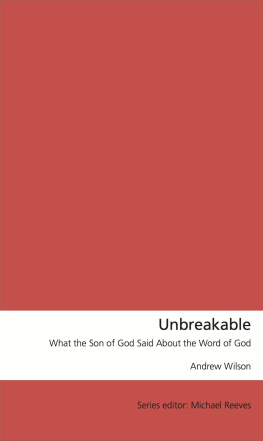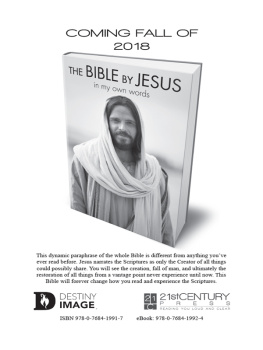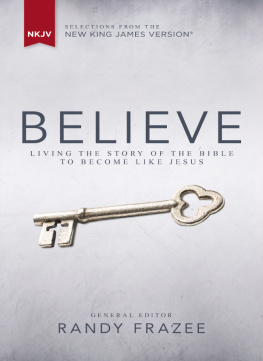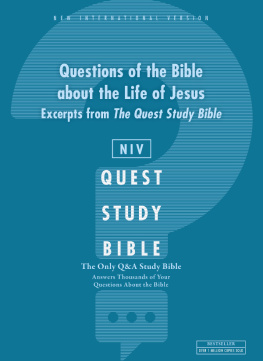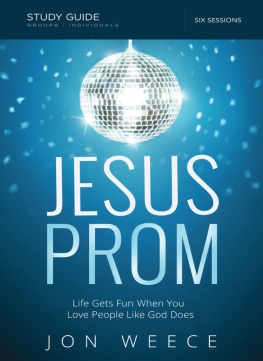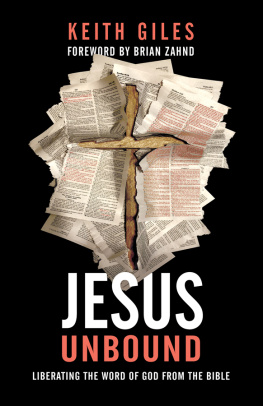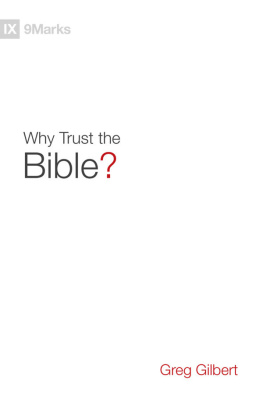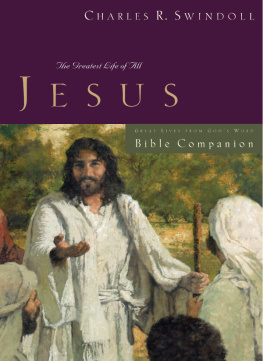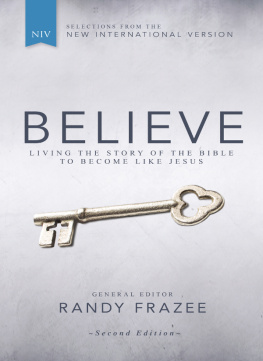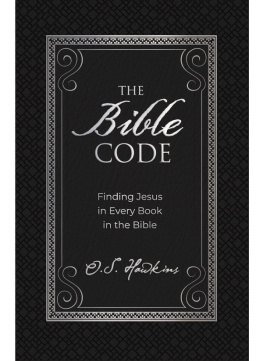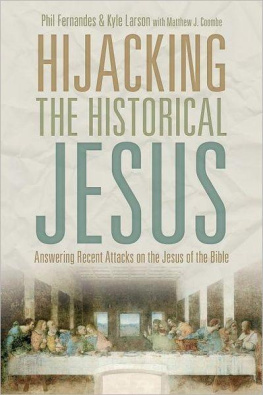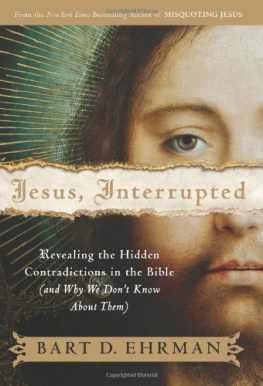Unbreakable
Andrew Wilson
Unless otherwise stated, Scripture quotations are taken from THE HOLY BIBLE, NEW INTERNATIONAL VERSION (Anglicised Edition). Copyright 1979, 1984, 2011 by Biblica (formerly International Bible Society). Used by permission of Hodder & Stoughton Publishers. All rights reserved. NIV is a registered trademark of Biblica. UK trademark number 1448790.
Copyright 2014 by Andrew Wilson
First published in Great Britain in 2014
The right of Andrew Wilson to be identified as the Author of this Work has been asserted by him in accordance with the Copyright, Designs and Patents Act 1988.
All rights reserved. No part of this publication may be reproduced, stored in a retrieval system or transmitted in any form or by any means, electronic, mechanical, photocopying, recording or otherwise, without the prior permission of the publisher or the Copyright Licensing Agency.
British Library Cataloguing in Publication Data
A record for this book is available from the British Library
ISBN: 9781909611863
eISBN: 9781910587041
Designed by Steve Devane
Printed and bound by CPI Group (UK) Ltd, Croydon, CR0 4YY
10Publishing, a division of 10ofthose.com
9D Centurion Court, Farington, Leyland, PR25 3UQ, England
Email:
Website: www.10ofthose.com
Unbreakable
Andrew Wilson

www.uniontheology.org
|  |
CONTENTS
 | This short book is a perfect combination: one of my favourite writers, with brilliant thinking and a breezy style, tackles one of the most important issues you could ever consider. The argument is simple yet profound: when it comes to the doctrine of Scripture, we cannot go wrong if we hold to the perspective of Jesus. |  |
JUSTIN TAYLOR SENIOR VICE PRESIDENT AT CROSSWAY AND BLOGGER AT BETWEEN TWO WORLDS |
Introduction:
WHERE DO WE START?
Books and talks on the Bible, in general, start from one of three places.
Some begin with the questions and problems people have with the Scriptures, and go through them one by one, explaining how best to think about them. I get that. The Bible contains puzzling details (swapping sandals in the middle of a love story), and upsetting stories (destroying Canaanite cities), and dramatic miracles (parting the Red Sea, really?), and factual difficulties (how did Judas die, again?), and unpopular teachings (sex is only meant for one man and one woman in marriage), and a confusing canon (what on earth is the apocrypha, and why dont we read it?), and so on. Therefore most of us have questions about the Bible big,difficult, sticky questions and engaging carefully with them is very important. But if we start from there, we risk putting ourselves immediately on the defensive and implying that our questions (which are different, as it happens, from the questions many cultures have asked) are the most important thing on the table. The chances are theyre not. So thats not where this book begins.
Others begin with what the Bible says about the Bible. As circular as that might sound, its actually quite sensible, because all sets of beliefs have to start somewhere; you trust reason because its rational, you trust experience because it fits with your experience, you trust the Bible because its biblical, and so on. Personally, though, I dont tend to do that, mainly because it looks suspiciously random (as in, why didnt we start with the Quran as our ultimate authority, or the Bhagavad Gita, or for that matter the Daily Mail?). So thats not where this book will start, either.
Instead, this book will use Jesus as the starting point. (Thats controversial, I know.) Ultimately, you see, our trust in the Bible stems from our trust in Jesus Christ: the man who is God, the King of the world, the crucified, risen and exalted rescuer.
Dont worry: well get to some of the big questions, and the witness of the rest of the Bible, as we go. But we begin where the gospel does, and where Christianity does. We begin with Jesus.
And God Said:
THE STORY OF SCRIPTURE
You could summarise the biblical story like this.
In the beginning, God.
Everything was shapeless, and empty, and dark. Blobs of unsorted, unformed matter drifting through space. An enormous cosmic splodge. A scribble.
And God said, Lights. And it happened.
And God said, and it happened. And God said, and it happened. And God said, and the earth did. And God said, and the animals did.
And God said, Go, have sex, have children, explore, rule, guard, keep. Have the run of the place. Watchout for one thing that particular tree brings knowledge of good and evil, and you dont want a piece of that but otherwise, its all yours. Enjoy. And the humans did.
And the snake said, Did God really say that? Are you going to let your lives be restricted by what you think he said? And the humans didnt. And it all went wrong.
And God said, and it happened.
And God said, and Abraham did. And God said, and it happened. And God said, and Israel didnt, although sometimes they did, but mostly they didnt. And God said, and it happened.
And God said, Heres my boy. I love him. Listen.
And the snake said, Are you really the Son of God? Why not do this, then?
And Jesus said, It is written.
And the snake said, Well, what about this, over here?
And Jesus said, It is written.
And the snake said, Or this?
And Jesus said, It is written.
And the humans said, Who do you think you are? What are you playing at? Nobody can do that, except God. If you go there, youll be killed. Are you mad? Are you demonised? Hes blaspheming! No, Master, this will never happen to you. And stuff like that.
And Jesus said, It is written in the Scriptures.
And the snake said, Give it up, Miracle Boy.
And Jesus said, How else will the Scriptures be fulfilled?
And the humans said, Crucify him. And it happened.
Silence.
And the humans waited.
And so did the angels.
And so did creation.
And so did the snake.
Did God really say?
Silence.
And God said, Lights.
And it happened.
THE AUTHORITY OF SCRIPTURE
That was the story in outline. We now need to go into it, a bit deeper.
At the start of the story, humanity is formed, then blessed, then sent, and then immediately tested. The snake, as weve just seen, goes straight for the issue of authority: Did God really say?Um. Ah. Well, you see, its Come to think of it, he No, perhaps he didnt. And it does look juicy, doesnt it? Crunch.
From now on, God says to the snake, there will be warfare between your seed and the womans. Youll damage his heel, but hell damage your head. One day a seed will come, born of woman, who will resist your temptations, stand firm in theface of trials, and crush you and all you stand for. Crunch.
As the Old Testament continues, we get increasing clarity about who this seed, this snake-cruncher, is going to be. Hes descended from Abraham, via Isaac, via Jacob, from the tribe of Judah, in the line of David, born of a virgin, in Bethlehem
As the story reaches its climax the seed is formed (in Mary), then blessed (at his baptism), then sent (into the wilderness), and then immediately tested. The snake is confident, seeing as Jesus hasnt eaten for six weeks: If youre the Son of God, command these stones to turn to bread. But Jesus is ready. It is written, he says, man doesnt live on just bread rolls, but on the words of God. Crunch.

